Leadership advisor and executive coach Maxine Nwaneri spoke with our editor Tola Doll Fisher about finding purpose and fulfillment – and the unexpected journey God has taken her on
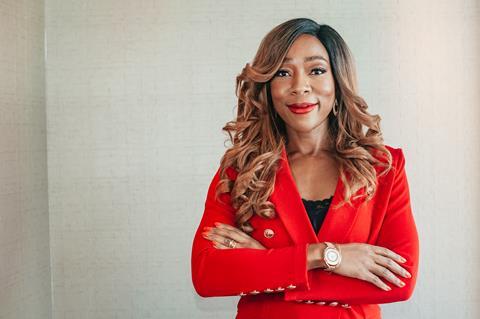
Tola-Doll Fisher (TDF): We’re here to talk about your book, The Future is Greater: A working mother’s guide to finding balance (HQ). You’re already a successful speaker and presenter, so what made you try your hand at writing?
Maxine Nwaneri (MN): I didn’t really want to but years ago I was part of an anthology with a group of about 40 friends. We wrote one chapter each and it became an Amazon bestseller. The book is called Courageous World Catalyst and it’s stories of overcoming to encourage anybody going through a hard time. Although it was fun, I thought that was the end of my writing career. But as I dealt with the challenges of the pandemic, quite like everyone else, my life began to collapse around me. I had two near-death experiences [you can read more about this in her book] - my world was a complete mess! I was like: “God, when are you going to fix my life?” And I heard him say: “Write a book.” I said: “No, no, God” but he kept on giving me word after word. So, to be honest, I didn’t want to write the book; I wanted God to fix my business, and I wanted him to tell me why I nearly died giving birth. I was so angry at him.
I heard his voice within saying: “This is not who you’re meant to be, you’re meant for so much more.”
I had somebody tell me that there were so many lives linked to the book; people who needed to read the story to be able to get through. I just kept thinking about that. But the anthology had been self-published and it took a lot of work even though I only wrote one chapter! I said to God: “I don’t want to self-publish so if you want me to write this book, get me a book deal.” I knew nobody in the publishing industry, so I knew it would take a miracle for this to happen. Within two or three days, I saw HarperCollins had advertised an academy for underrepresented writers looking to get a book deal and signed up. It was so competitive, with something like more than 800 applications and they just wanted 15 people for non-fiction. Well, I got in. That’s when I thought: “OK I’m listening!”

TDF: I know you talk about some of your recent difficulties in “The Future is Greater,” but I’m curious about the formative experiences you mentioned in your first book on overcoming. Can you share a bit about those?
MN: I shared about growing up in Nigeria and moving to the UK and just falling off track really. I was very quiet, shy and introverted in Nigeria and stayed that way when we moved. Here in the UK, I was just easily influenced. There’s a saying that if you don’t stand for anything, you’ll fall for anything. That was me. I got in with the wrong crowd and ended up doing all sorts of crazy stuff. I ran away from home as a teen, so I was homeless and my life was a complete mess. It was from that place, of really just being lost, that I began to build again. In the book I didn’t say it was God, but it clearly was God who got me back on track. I heard his voice within saying: “This is not who you’re meant to be, you’re meant for so much more.” I followed that voice from homelessness to getting back into the school system, breaking off addictions and ended up going to Cambridge. There were just so many things that seemed to happen from nowhere.
TDF: You mention God as being part of that journey. Were you already following God in Nigeria?
MN: No. I think growing up in Nigeria, God was more like my grandfather. We went to church, but it was just because my parents went. I didn’t have a relationship with God. When I came to the UK, and began to rebel, God definitely wasn’t my father. However, I discovered him in that pit. It’s almost like he said: “I’m not your grandfather. I can be your father.”
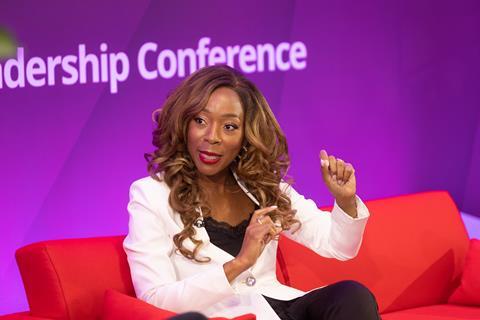
TDF: The Future Is Greater leans heavily on this idea of purpose. How would you define purpose and how do we find it?
MN: I think purpose is at the core of who you are and what you’re here to do. You’ll find your purpose by really listening to the voice of God, as he brings you to the right people to speak to, he brings you to situations; what are the things that you see yourself repeatedly doing? What do people call you up for? Just be conscious of the consistent things that pop up when you’re listening to him.
Purpose is what gives us that true sense of meaning, because we’re doing what we’re here to do. So, for me, regardless of my bank account or what else is going on in my life, if I’m resurrecting something, if I’m bringing up hope in somebody, then I am doing what I’m meant to do and I feel successful, regardless of what those external measures of success may or may not be saying.
TDF: You often say that anything is possible. Do you really believe that? And would you say this is biblical thinking?
MN: Yeah, I really believe it. I mean, sometimes I sit down and think about my life and it feels like I’m watching the film version of another person. Because, you know, God says he will do infinitely, abundantly above all you can ask, think or imagine [Ephesians 3:20]. I look at my life, and while it’s not perfect, think about who I was, ten, 20 years ago; that person could not have dreamed what I’m doing now. But that’s God.
TDF: The Future is Greater has a mainstream publisher so some of your readers won’t have a faith background. How do you communicate that sense of anything being possible to non-Christians?
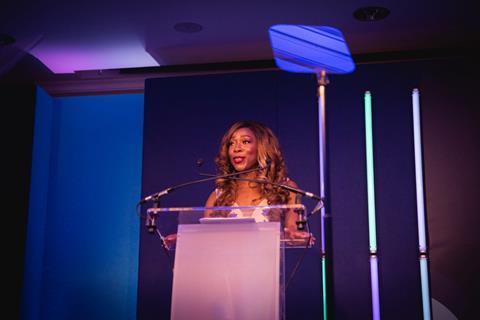
MN: This is interesting, because the book as it is, is the third rewrite. In the first draft there was a lot of ‘Christianese’ and scripture etc. My publisher said: “Oh, yeah, this is great, but we’re going to alienate certain readers.” I was quite upset when they gave me that feedback, because I thought: “Well, God asked me to write a book so of course, it’s going to have scriptures all over it.” I remember going back to God and saying: “I wrote your book and they don’t like it, what’s going on? He told me: “This is me speaking through them. Because I need you to communicate to them the hope that I give without all of those things that people who have grown up in church are so comfortable with.” A lot of these success principles that you read from motivational speakers are biblical principles. Things like needing a vision, for example. The Bible talks about how if you are without vision, people perish [Proverbs 29:18]. God had me translate from the Bible with the view that when people’s lives are transformed through these sound, biblical principles, they ask: “Well, how do you know all this stuff?” Then you tell them about Jesus.
TDF: That’s fascinating because it means your work and your writing are so much more accessible. It’s interesting that you recognise it as God rather than the devil trying to shut down your words.
MN: To begin with, I was like: “Get thee behind me, Satan!” It took me so long, but I learned I literally had to go back and say: “OK if the Bible says this, how can I say it in a way that doesn’t tell them I’m saying it’s from the Bible.” I’m trying not to water things down. I use my own life where I’ve actually clearly seen these principles at work to explain things.
TDF: One of the really innovative things you do for your clients, and mention in your book, is help them map out what you call a CRISIS plan. How does that work?
MN: When things are chaotic, it’s so easy to just react to what’s going on. The key point of the crisis success plan is that you don’t react, you respond. Because when you’re reacting, you’re not necessarily doing what God wants you to be doing. So, the CRISIS success plan gets you to ask: “What am I supposed to be? How am I supposed to be responding to this so I can create what it is that God wants me to create?” I’ve personally gone through many crises and found that, actually, some of the most powerful things have been created in crisis, but they’ve never come when I’ve just been reacting.
Purpose is what gives us that true sense of meaning, because we’re doing what we’re here to do
TDF: Many successful women talk about dealing with impostor syndrome. How have you seen that show up in your work either in yourself or in your clients? And how can we overcome that as women?
MN: I get to coach women at all levels, including politicians and successful business women, and yet so many of them deal with it. I recently received an award from Baroness Sandy Verma of the House of Lords. We had to get up and give speeches and a few of the award winners were saying: “Oh, I feel like an imposter” or words to that effect. The Baroness said: “Stop all this talk about imposter syndrome. Everybody feels it. If you walk into a room, stop wondering: ‘Why am I here? Do I deserve to be here?’ You’re here. So just say what needs to be said and do what needs to be done.” That really stuck with me. So how do we get over it? I think you remember God has brought you here, and your gift will make room for you. And as Christians, we have the Holy Spirit, the power that raised Christ from the dead lives in us and he can give us what to say.
TDF: This is a book for working mothers, so have you encountered women who might be worried that choosing to be a parent could be detrimental to their professional lives?
MN: Oh, constantly. And the phrase that comes to mind is literally the title of this book: ‘The future is greater’! Because so often we try to hold on to what we know. But typically, I’ve found that, yes, having children changes things so trying to hold on to what we know doesn’t make sense. Be open to the fact that it’s going be different and think: “OK, what else can I create here?” When I was worried about how having a child was going to fit in with my corporate career, I was doing really well and struggling desperately to keep progressing through those corporate ranks. And yet [Maxine now has two children], when I look at what God has actually done for me – oh, my goodness, it’s so much better. But when you’re holding on to what you know, you don’t open yourself up to what could be. I’m not in that corporate world anymore, but I’m an author, speaker and a coach. I never saw that coming, but it all happened from motherhood.
So yes, you might suffer, you might make a lot less money, or whatever. But are you doing what it is that you’re here to do? Because God will not say: “Oh, well, she’s had a baby now. She can’t fulfil her purpose anymore.”
With non-Christian clients I ask them: “What is your purpose? Is your purpose ultimately, to keep progressing up this career ladder making more money? Or is your purpose something else?” And typically, when people are honest with themselves, they can find fulfilling purpose as a mother, if that’s the path that’s meant for them.

So, I say to people: “Don’t hold on to measures of success that you know. What is your path?” If we’re open for some of the worldly success measures to potentially be knocked, but we stay on track to purpose, we’ll find that it’s fulfilling.
The world tries to tell us that we need more of this or need to be more that or achieve this. So, we go through life thinking we are not enough. I’d love to let all Woman Alive readers know that you’re so enough. God didn’t make a mistake with you; you’re brilliant and you’re here for a reason. Go do it.
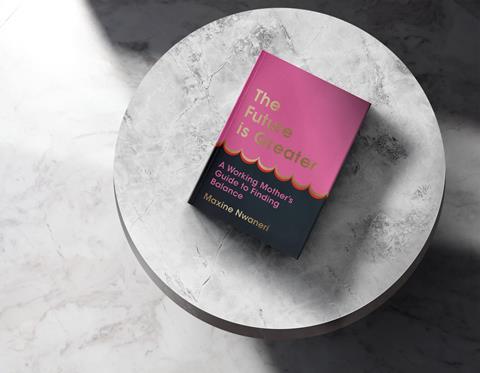
Find out more about Maxine and her book at thefutureisgreater.com
You can hear Maxine speak at the Wise Well Woman Summit on 16 March in London. Register your details here: https://bit.ly/Wise_Well_Woman_Summit_March24
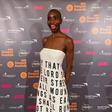











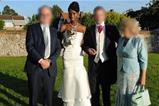

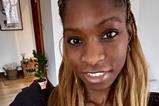

















No comments yet